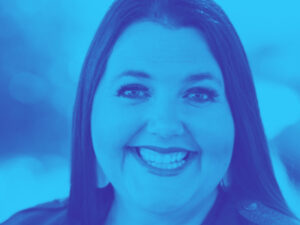October Instructor Spotlight: Misty Dawn Falkner
 Our October Instructor Spotlight is Misty Dawn Falkner. Misty is teaching two classes this month:
Our October Instructor Spotlight is Misty Dawn Falkner. Misty is teaching two classes this month:
Curating Constructive Conversations that Promote Human Flourishing on October 5, 2 - 3 PM ET
Strengths-Based Approach to Handling Workplace Stress on October 10, 2 -3 PM ET
Misty Dawn Falkner is the founder and owner of Live Meraki, a strengths-based coaching and consulting business. She has always been passionate about helping others to become their own extraordinary. She is a Gallup-certified Strengths-Based Educator and Executive Coach. Her experience working in corporate, community and academic settings informs her holistic and practical approach to cultivating meaningful opportunities for individuals and teams to experience growth and how to leverage those strengths for community development. The goal of her work is to creatively and strategically help others discover pathways to greater engagement and increased hope. Misty currently lives in Prescott, AZ with her husband of 23 years, Eric. She loves to be in nature, reading a good book and listening to an eclectic playlist of music.
We recently chatted with Misty as part of our Instructor Spotlight Series to learn more about the upcoming class.
As the founder and owner of Live Meraki, can you tell us more about strengths-based approaches?
MDF: A strengths-based approach allows for us to seek success through our unique diversity. It begins with building an awareness of what our individual strengths are, developing them through good character, knowledge and skill, and then applying them to the situation in front of us. There is not one way to succeed but infinitely many ways. I love this approach because no one gets left out or left behind! We are all made to flourish.
Lyrasis members are fortunate to have access to your expertise. You are teaching not 1 but 2 classes this month, Curating Constructive Conversations that Promote Human Flourishing on October 5 and Strengths-based Approach Handling Workplace Stress on October 10. Without giving away too much, can you tell us what prompted you to write and share your knowledge about cultivate meaningful conversations in libraries, archives, museums and communities at large?
This class was born out of the work that I began doing at Arizona State University several years ago as part of the Council of Religious Advisors for the university. Seeing that spirituality played a key role in students’ lives culturally and practically, there was a deep need to discuss how this impacts their studies, living situations, meal plans, identity, community and ultimately, their academic success moved me to work together with university and religious community leaders. We worked to provide opportunities, both formal and informal, to engage in conversations around important topics. With the ultimate goal being to create an environment where curiosity, compassion and community led.
Libraries, archives and museums are crucial parts of the tapestry of our communities! Any place where diverse communities intersect with creative, yet structured opportunity for engagement will always draw me to put the call out that we can do more to engage with one another in meaningful ways. I was asked at a conference what my definition of human flourishing would be and at its essence it would be that an individual can show up as their whole selves everywhere they go, meaning that they don’t have to leave their faith or race or gender or nationality at the door when they come to school or work or the store. Even in the grocery store, I find myself seeking to curate meaningful conversations that connect me to the people I encounter and hopefully bring more of who they are into the places we share. (My favorite question right now: What has been the BEST part of your week so far?)
October is National Depression and Mental Health Month. Stress is a huge feat many of us struggle to balance. I am excited to learn about your approach to stress. But for many of us, included, it’s stressful to think about managing stress. Is there a step 1 or a before we take this class that we should do to prepare?
MDF: Thank you for bringing that up! All too often dealing with stress becomes one more thing on our list, adding to our stress. I would encourage each of us to start by thinking about what brings us joy. It can big or small, serious or silly. If you are struggling to find something, I encourage you to go back to when you were younger and let your younger self remind you of where you found simple joys. My current work has led me to starting a school and this is something I use with my students in taking a strengths-based approach to stress. Some of them find joy in music, others in moving, others in drawing, others in being quiet on their own and others in being close to someone they can talk to…often the key to unlocking the stress of stress is to lean into who we are without all the “stuff” we have to do. My students use their strengths to help them settle in and banish stress so they can do the work in front of them.
Finally, what are you currently reading or listening to?
MDF: My days are gloriously full right now, so Audible is my go-to for books at the moment. I am re-listening to Love + Work by Marcus Buckingham with the intention of seeing how I can infuse this strategy of finding what you love, loving what you do and then doing it for the rest of your life into our school’s curriculum. As for what I am listening to in this season, I love music and I am enchanted with French pop right now, specifically, “T’es beau, t’es beau” by Joyce Jonathan. Also my students and I start our day with the anthem, “I’m So Blessed (Best Day Remix)” by CAIN.
